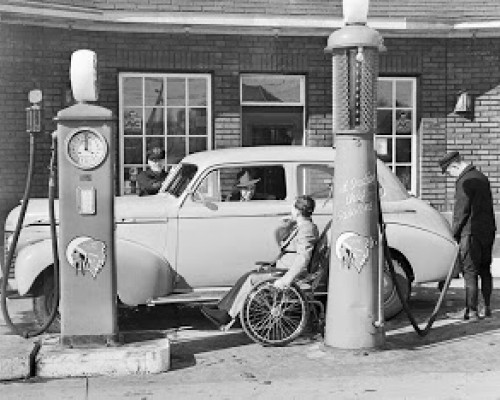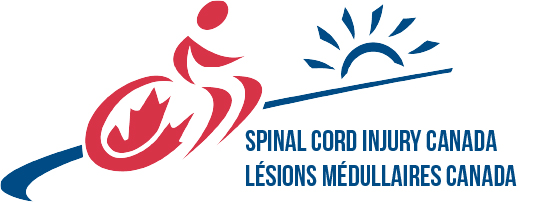The First Peer Providing Peer Support

The following story is historical fiction, based on research from many different sources. Thank you to all of those who documented Spinal Cord Injury Canada's history.
The story of Jimmy Darou
It is an August day in 1933. I am at Cannaught Park Race Track in Gatineau, Quebec. I am sitting on my brother-in-law's horse waiting for the gate to open. Today, I intend to win this race. I am doing pretty well on the circuit between Dorval and Toronto. I usually ride Mr. Wilfred T. Trenholme's horses. He is pleased with my performances so far, and I intend to keep up his confidence. The gate opens, and we are off. I simply love the feeling at the start of a race. The horse and I are one. We push forward through the crowd.
I'm not sure what happens next. Maybe the horses clip heels. I don't know. Suddenly, I am on the ground, and my horse lands on top of me. I can't move. The ambulance comes to take me off the track, and I can see the worried faces in the stands. Among them, I see my sister Marjorie's face.
In the hospital, I am told my future does not look good. The doctors say they can do very little for me, and I probably will only live a few more years. I am sent to the Prevost Sanitorium. But I'm still young, and I don't believe my life is over. It is so hard to keep positive. But each morning, from my bed, I listen on my transistor radio to a character on NBC from San Francisco named Cheerio. He reads poems, and he tells the most inspirational stories about people like me, shut-ins, who find a way to get on with their lives. Listening helps me feel connected to the rest of the world. I think if these people can live independently, maybe I can, too. I start working on building up my strength. I design my own training program. I write several letters to Cheerio telling him how much I enjoy his show. Then, Cheerio decides to come to Montreal to meet me. On February 28, 1936, he airs his radio show right from my room!
At the same time, Mr. Trenholme and other racing friends are raising funds to help me buy a business. I can't believe how super my friends are. I am an incredibly lucky man. There is an event held at The Forum, and even my sisters, Marjorie and Doris, take part as dancers. I am also invited to enjoy ring-side seats at a wrestling match, where the money raised goes towards helping me. Some friends even write to Eleanor Roosevelt and ask her to send me good wishes. They figure she will deeply understand my situation on account of the fact the President uses a wheelchair. That Mrs. Roosevelt, in turn, sends me my own wheelchair! I can hardly believe it! Now, I can get around. As soon as I am strong enough, I leave the sanitorium.
With the money raised by my horse-racing friends, I go from horse jockey to gas jockey. I now have my own gas station at 1 Westminster Avenue, on the corner of Sherbrooke Street in West Montreal. I live upstairs, above the station, and each night I pull myself up with a rope. Friends drop by all the time for gas and chats. I'm actually very happy with my life. The only problem is I'm not making enough money to keep the gas station open. I'm hustling, but it is a tough go. In 1940, that wonderful Mr. Trenholme gives me one of his racehorses to help me with my expenses. After that gift, I am in the black thanks to my regular winnings at the track and because I start breeding horses. I am forever thankful for the kindness of the people in my life.
It seems only right to try and find a way that I can also be helpful to others. I know how much my radio was a lifeline to the outside world, so when I have enough money, I start sending radios to people who cannot get out of their homes. I also begin visiting veterans who have returned from WW11. I go to the Montreal Neurological Institute because I know that's where they will take guys with spinal cord injuries, like me. In 1943, I meet John Counsell.
When I get to the hospital, John is in his bed. I told him straight up, stop feeling sorry for yourself, and start working on getting your life back. I can be direct like this because I understand what he is feeling. It is easy to get depressed. Sometimes people just need a little kick, and then they figure it out on their own.
John and I become good friends. I tell him all about my business and how I live my days. He is keen to know about my regular exercises, and how I look after myself. We have long talks about people's rights, and how to make sure people with paraplegia are independent and participate in life. John is frustrated that the Canadian government doesn't support people with spinal cord injuries with programs and services. As a veteran, he knows he can push the officials to provide the funds. He promises me that he will also fight for civilians to get the proper support they need.
After a few months in Montreal, when John is strong enough, he leaves the hospital for Toronto to be closer to family. It turns out we both have a love for the ponies, so I travel to Toronto quite regularly over the next few decades to watch various horse races. My favourite is always the Queen's Plate. In 1945, John starts an organization called the Canadian Paraplegic Association. True to his word, John sets up the organization to serve civilians, too, and so I join. One of the organization's directors is Major Conn Smythe. Conn gets an office for the Canadian Paraplegic Association at Maple Leaf Gardens. He also arranges hockey tickets for members of the organization. The wife and I go to Toronto, stay at the Royal York, see the game, and thoroughly enjoy the familiarity with others with spinal cord injuries.
I live until 1975 – way past the timeline those doctors gave me when I was first injured. I can honestly say that my life was full and satisfying, thanks to the right people's support at the right time.
